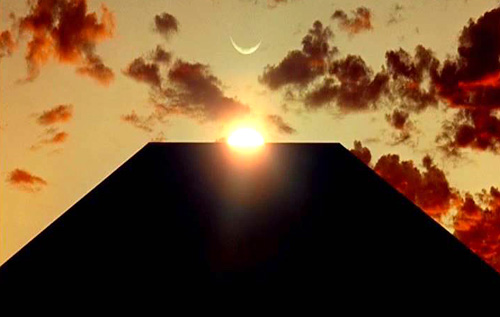–noun
| 1. | a person's greatest piece of work, as in an art. |
| 2. | anything done with masterly skill: a masterpiece of improvisation. |
| 3. | a consummate example of skill or excellence of any kind: The chef's cake was a masterpiece. |
The Masterpieces is an ongoing list of the greatest achievements in cinema from around the world. The only requirement is that no movie released in the last year can be added. These are the films that set the highest standards for their art form and respective genres. They can be important socially and universally or they can resonate on a deeply personal level or they can simply be incredibly entertaining.
--------------------------------------------------------------------------------------------------------------
2001: A Space Odyssey

Directed by Stanley Kubrick
Written by Stanley Kubrick & Arthur C. Clarke
2001: A Space Odyssey is an undeniable masterpiece. It remains the most visually stunning film ever made. It's soundtrack is perfect and compliments the goings-on in the film better than anything before or after it. The character of "HAL", the corrupt computer that turns on a spaceship crew, has remained in pop culture with countless references in TV & film. Anthony Hopkins even claims to have used "HAL" to help find the voice of Hannibal Lecter, which he won an Oscar for portraying in Silence of the Lambs. I've always found it odd that "HAL" is the most popular part of the movie.
I savour every moment from beginning to end, but I do have a stronger affection for the opening and closing of the film. It begins with a pitch black screen, which holds for quite a while. Then we follow a group of apes at the dawn of time, fascinated by a black column sticking out of the ground. There are many great discussions to be had regarding this mysterious monolith. It has been suggested that they are some form of marker left by an alien race. What does it mark? Perhaps human progress. We see two more monoliths throughout 2001, and that theory seems concrete. Do the monoliths cause our progress? This is something Kubrick himself allegedly said. Whether that's true or not, it is clear that the film is a philosophical one. It is, as art always is, open to interpretation. Different people can see the movie and take away their own philosophical musings. Some see it as completely religious. Others see it as a story devoid of any evidence of a god. The film is a conversationalist's dream. Moreover, it is a movie lover's dream.
Kubrick and Clarke dreamed up a work of science fiction yet to be matched. Rich story aside, just watching the film and listening to it's euphonious soundtrack is an experience to behold. 2001 is filled to the brim with overwhelmingly incredible imagery. Consider the fact that film was released in 1968, 9 years before Star Wars. I still don't think any movie has portrayed space as successfully. It was apparently a requirement for astronauts in training to watch the movie. 2001: A Space Odyssey is one of the most profound and rewarding movies I have ever seen. Much like the monoliths left, perhaps by more advanced life, Kubrick's film provokes us to explore our intellect, and to progress.





1 comment:
top [url=http://www.c-online-casino.co.uk/]uk online casinos[/url] brake the latest [url=http://www.realcazinoz.com/]casino[/url] unshackled no consign hand-out at the best [url=http://www.baywatchcasino.com/]baywatchcasino.com
[/url].
Post a Comment